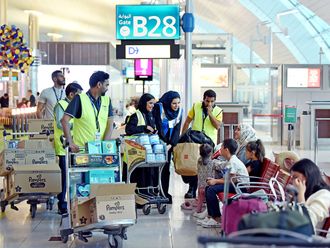Abu Dhabi: The contract to build a bioenergy pilot project for Abu Dhabi’s renewable energy research centre, the Masdar Institute of Science and Technology (MIST), was on Tuesday awarded to the Abu Dhabi-based International Mechanical and Electrical Company LLC.
The contract was announced on the sidelines of the World Future Energy Summit in the capital. The associated project aims to produce aviation biofuels and food using desert land and saline seawater, unlike traditional bioenergy schemes that use arable land and freshwater.
The project is being funded through the Sustainable Bioenergy Research Consortium (SBRC), founded by MIST, aircraft manufacturer Boeing, Etihad Airways and other companies.
The pilot will be located at Masdar City on the suburbs of the capital, and will span two hectares.
The system will first pump seawater into aquaculture ponds that grow shrimp and other fish. Fish waste released into the water, which is rich in nutrients, will then be used to fertilise halophytes (plants adapted to growing in salt water). Biomass and oils will then be harvested from these fields.
“We estimate that initially, we can get about two tonnes of oil seed and 18 tonnes of biomass per hectare. But with simple agronomic adjustments, we expect to double the yield in about two to three years, and then be able to scale up the project,” Dr Alejandro Rios, director at the SBRC, told Gulf News.
The goal is also to move to a 200-hectare facility so that more biofuel can be produced.
“Typically, a commercial bioenergy farm spans 20,000 hectares, and through our research, we aim to show that that the system can be scaled up to these levels,” Dr Rios added.
The pilot is expected to run from three to five years, but this could be extended if researchers want to use the facility to explore the effect of changing variables, such as salinity, water temperature and plant species, on biofuel yield.
Dr Rios also explained that the effluent from the fields, which will be discharged into the sea, will be very similar to the seawater. The halophytes will first clean the effluent biologically, after which it will be pumped into mangrove marshes to further filter it and also remove carbon.
The global aviation industry is estimated to produce two per cent of the world’s carbon emissions at present, but the growth of airlines in emerging economies is expected to double or triple this share very soon. In a bid to limit climate change, the International Civil Aviation Organisation has therefore announced that it hopes to cut total emissions in 2005 by half by 2020.
“This is why such projects, that use amply available seawater [97 per cent of the world’s water supply] and desert land to produce renewable energies, are so important to ensuring sustainability,” said Barbara Bramble, chair of the board at the biomaterial standards developer, Roundtable for Sustainable Biomaterials.












